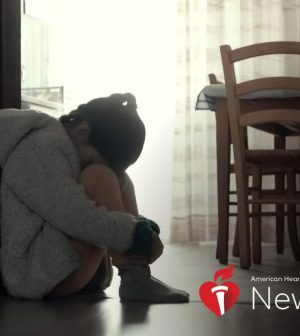- Could Your Grocery Store Meat Be Causing Recurring UTIs?
- Are You Making This Expensive Thermostat Error This Winter?
- Recognizing the Signs of Hypothyroidism
- 10 Strategies to Overcome Insomnia
- Could Artificial Sweeteners Be Aging the Brain Faster?
- Techniques for Soothing Your Nervous System
- Does the Water in Your House Smell Funny? Here’s Why
- Can a Daily Dose of Apple Cider Vinegar Actually Aid Weight Loss?
- 6 Health Beverages That Can Actually Spike Your Blood Sugar
- Treatment Options for Social Anxiety Disorder
AHA News: Abuse, Neglect in Childhood May Increase Heart Failure Risk as an Adult

WEDNESDAY, Oct. 5, 2022 (American Heart Association News) — Childhood trauma, especially physical abuse, might increase the risk of heart failure later in life, according to new research.
Past studies have found a connection between traumatic experiences in childhood and cardiovascular disease and other health problems. But there’s been little research on a specific link to heart failure, in which the heart can’t pump enough blood to meet the body’s needs. Heart failure affects about 6 million U.S. adults.
Researchers looked at data from 153,287 adults in the United Kingdom and zeroed in on which participants experienced childhood maltreatment – defined in the study as physical abuse, physical neglect, emotional abuse, emotional neglect and sexual abuse. The study also examined whether participants had a genetic predisposition for heart failure.
After about 12 years of follow-up, 2,067 participants developed heart failure. Experiencing any one of those types of childhood maltreatment was associated with a 14% increase in the risk of developing heart failure. Participants with three to five types of childhood maltreatment had a 43% increased risk.
Researchers found childhood maltreatment increased heart failure risk even among those with a low genetic risk. The study was published Wednesday in the Journal of the American Heart Association.
Dr. Qingshan Geng, the study’s co-senior author, said that while the findings were somewhat expected, they “suggest childhood maltreatment can be a new predictor of heart failure in later life. Even when the genetic susceptibility for heart failure of high-risk individuals is low, early identification of childhood maltreatment may help inform long-term heart failure risk.”
Geng, a cardiologist at Guangdong Provincial People’s Hospital in China, called on cardiologists to work more closely with psychiatrists and psychologists to come up with new ways of fighting cardiovascular diseases. He also encouraged those who’ve experienced mistreatment to be proactive about their health.
Co-senior author Dr. Jihui Zhang, a psychiatrist at the Affiliated Brain Hospital of Guangzhou Medical University in China, agreed. “Patients who have experienced adverse events in childhood are encouraged to increase physical activity, maintain a normal body weight and improve their lifestyle to reduce future heart failure risk.”
The study found physical abuse was independently associated with the highest increase in risk (32%), followed by emotional abuse (26%), physical neglect (23%), sexual abuse (15%) and emotional neglect (12%).
Zhang said that because of its design, the study did not show a cause-and-effect relationship. Among the study’s other limitations, childhood maltreatment was recalled in adult life rather than being measured from childhood, and the severity, frequency and duration of maltreatment were not measured.
Shakira Suglia, who was not involved in the study, chaired the committee that wrote the American Heart Association’s 2017 scientific statement on childhood adversity and cardiometabolic health. She applauded the authors for “adding to the evidence about the long-lasting impact of maltreatment and also for examining genetic risk, which is a piece that’s not often brought into the picture.”
Suglia, a professor of epidemiology at Emory University in Atlanta, called for future studies on possible ways to “buffer the impact” of adverse childhood experiences.
She said the study was a potent reminder to parents and others of the importance of a secure, attentive upbringing.
“Children thrive in safe, stable, nurturing environments. If a child does experience something traumatic, we have to make sure to provide all the support that is needed so there are no adverse consequences,” Suglia said.
“This goes beyond cardiovascular disease. It’s really about a child’s mental health, well-being and overall healthy development.”
American Heart Association News covers heart and brain health. Not all views expressed in this story reflect the official position of the American Heart Association. Copyright is owned or held by the American Heart Association, Inc., and all rights are reserved. If you have questions or comments about this story, please email editor@heart.org.
By Thor Christensen, American Heart Association News
Copyright © 2026 HealthDay. All rights reserved.










